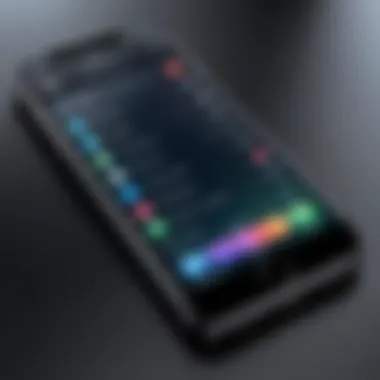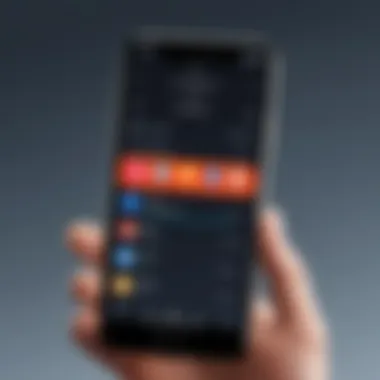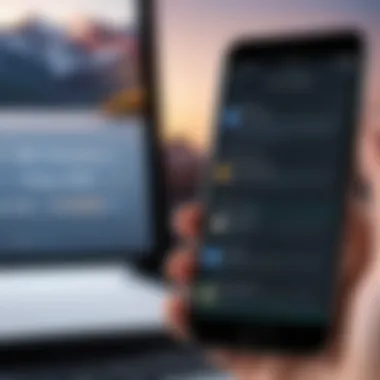Can You Legally Record Phone Calls on iPhone?


Intro
The use of smartphones has evolved into a cornerstone of modern communication, yet many users remain unaware of the full capabilities of their devices. Among these capabilities is the ability to record phone calls. For iPhone users, this topic attracts considerable interest due to both its functional applications and the surrounding legal considerations. This article delves into the intricate aspects of recording calls on an iPhone, encompassing the technical methods employed, the implications for user privacy, and an overview of the available options.
Understanding whether calls can be recorded on an iPhone necessitates a closer examination of various factors, including native features offered by iOS, compatibility with third-party applications, and the legal framework governing such practices. Ultimately, this guide aims to clarify misconceptions and present a detailed understanding for both casual users and tech enthusiasts regarding the viability and legality of recording conversations on their devices.
Key Features
Recording phone calls can serve multiple purposes, from documenting conversations for professional purposes to ensuring accuracy in personal communication. However, the ability to do so is not embedded in the native functionality of iOS, leading to a reliance on alternative solutions. Here are some key features of the recording process on iPhones that potential users should consider:
- Ease of Use: Any method chosen should offer a user-friendly interface that does not disrupt the natural flow of conversation.
- Audio Quality: The clarity of recorded audio is vital. High-quality recordings can influence usability and effectiveness in professional scenarios.
- Compliance with Legal Standards: Ensuring the method complies with local laws regarding the consent of all parties involved is crucial. Ignoring legal stipulations can lead to serious consequences.
Legal Considerations
Before diving into the technicalities, it is essential to address legal considerations. The legality surrounding recording phone calls varies widely between jurisdictions. In the United States, laws can differ dramatically from state to state, falling primarily into two categories:
- One-party consent: Only one person involved in the conversation needs to consent to the recording.
- Two-party consent: All participants must agree to the recording.
Important Note: Failing to adhere to these laws can result in legal ramifications. Always research and understand the laws applicable in your location.
Technical Methods
There are a few common methods through which iPhone users can record calls:
- Third-party applications: Numerous apps, like Rev Call Recorder and TapeACall, provide call recording features. These apps often operate by creating a three-way call. One line is your call, the second is a dedicated recording line.
- Voicemail workarounds: Some users have utilized voicemail systems creatively to record calls, though this method can be cumbersome and may not yield the best audio quality.
- External recording devices: Connecting an external recorder through the headphone jack or using speakerphone settings can offer an alternative, albeit less convenient, method of recording.
Each of these methods possesses their own merits and limits. Users must weigh these options against privacy implications and ease of use.
Epilogue
In summary, while iPhones don’t include built-in call recording features, various methods exist to enable users to record calls. It is critical to navigate this terrain with care, both technologically and legally. By understanding the options available, users can make informed choices about recording calls, safeguarding privacy while ensuring compliance with relevant laws. Armed with this knowledge, both tech-savvy individuals and casual users can confidently approach the call recording function.
Understanding Call Recording Basics
Call recording has become an increasingly relevant topic in our digital world. As communication shifts towards mobile devices, the ability to record conversations on smartphones, especially iPhones, raises important questions. Understanding the basics of call recording is crucial for several reasons. It encompasses not only the definition and techniques but also the implications of capturing calls and the potential benefits. This section aims to provide clarity on what call recording is and why someone might want to use this feature.
Definition of Call Recording
Call recording refers to the process of capturing audio from a phone conversation. This can involve various methods, from built-in features of smartphones to dedicated applications designed for this purpose. On iPhone, the capability to record calls directly is not supported natively. Users must rely on alternative means, such as third-party applications or external hardware solutions. Understanding the definition helps in recognizing the different approaches available for iPhone users to capture their conversations, whether for business, personal, or legal purposes.
Benefits of Recording Calls
Recording phone calls can yield numerous benefits which may cater to different users’ needs. Here are some key advantages:
- Documentation: Recorded calls serve as a record of conversations, which can be essential in legal, business, or personal disputes.
- Compliance: For businesses, recording calls aids in ensuring adherence to regulatory standards and company policies. It serves as training material to enhance employee performance.
- Memory Aid: People often forget details from conversations. Having a recording helps you reference important points discussed without relying on memory alone.
- Security: Recording can play a role in providing transparency in communications, particularly in transactions or agreements.
"Knowing the benefits of call recording can influence one's decision on whether to implement it when using technology like the iPhone."
Recognizing these advantages can assist users in understanding the value of recording calls while considering their own circumstances and needs.
Legal Considerations


Understanding the legal landscape surrounding call recording is essential for iPhone users. Laws governing call recording vary by region and can significantly affect how and when recording is permissible. Navigating these legal stipulations is vital to avoid potential legal repercussions. The lack of knowledge about these laws can lead to serious consequences, such as legal actions or breaches of privacy legislation. Thus, being informed is not just beneficial, it's crucial for anyone considering recording phone calls.
Recording Laws by Region
Call recording laws differ substantially around the world. In the United States, for example, some states require the consent of all parties in a conversation, while others only mandate consent from one party. Almost half of the states follow the two-party consent rule, which means both parties must agree to the recording. In contrast, federal law allows recording if at least one party is aware of the recording.
In contrast, countries like the UK have strict regulations that generally require consent from the person being recorded. The General Data Protection Regulation (GDPR) in Europe imposes even stricter conditions, making it essential for users to be aware of who can access and process their data. Some regions may even have more complex laws, making it difficult to keep track of which rules apply where. Consider the following:
- United States: Varies by state; either one-party or two-party consent.
- United Kingdom: Consent required, primarily for personal use.
- European Union: GDPR imposes strict regulations on data recording and privacy.
It is advisable to research local laws thoroughly before attempting to record any call. You could visit reputable sources like Wikipedia or check legal forums like Reddit for updated information about recording laws in your region.
Implications of Unauthorized Recording
Recording a call without the consent of the participants can lead to severe legal and ethical implications. The unauthorized recording not only breaches trust but can also expose individuals to legal charges. Violating consent laws may result in civil lawsuits or even criminal charges, depending on the jurisdiction. Here are some implications to consider:
- Legal Charges: Unauthorized recording might lead to violations of wiretapping laws.
- Loss of Trust: Breaching trust could damage personal and professional relationships.
- Data Privacy Violations: Non-compliance with privacy laws can attract significant penalties, especially in regions with strict regulations.
"Understanding the legal framework is not just about compliance; it is about respecting the rights of others."
In summary, engaging in call recording without understanding the legal implications can have serious consequences. It is paramount to familiarize oneself with applicable laws and regulations to ensure ethical practices when recording calls.
Native Recording Features on iPhone
Understanding the native recording features on iPhone is crucial for users who want to explore call recording possibilities. Despite the high demand for such functionalities, Apple's native offerings have specific characteristics and limitations that influence how users can capture and store their conversations.
The Importance of Native Features
Utilizing built-in features can simplify the recording process as they do not require third-party software. Users often prefer to leverage existing tools within the device, combining convenience with efficiency. Additionally, native apps are typically more secure compared to external applications. The integration with iPhone’s operating system ensures better stability and performance.
Using Voice Memos for Recording
Voice Memos is a pre-installed application on iPhones. While it is not explicitly designed for recording calls, users can creatively utilize it under certain conditions. To record a call using Voice Memos, one practical method is to use the speakerphone function during the call. The user can then start a Voice Memos recording.
Steps to Record a Call with Voice Memos:
- Initiate Your Call: Begin your conversation as you normally would.
- Activate Speakerphone: Once the call connects, switch to speakerphone.
- Open Voice Memos: Launch the Voice Memos app from your home screen.
- Record: Press the record button to begin capturing the dialogue.
- Stop Recording: Once the conversation is finished, stop recording and save the file.
While this method is functional, it does require some effort. Users should note that not all conversations may be captured perfectly due to ambient noise or distance from the microphone. Also, this approach raises potential legal concerns, as it might be against regulations without consent.
Limitations of Built-in Features
The native recording features are quite limited when it comes to capturing calls. There are several constraints that users should be aware of:
- No Direct Call Recording: The iPhone does not provide an integrated feature that allows direct recording of phone calls.
- Permissions and Legal Issues: Given the varying recording laws across different regions, users must ensure compliance when using any recording method.
- Audio Quality: The quality of recordings using methods like Voice Memos may not be optimal, especially in noisy environments. This can potentially impair the utility of the recorded conversations.
- Incompatibility with Encryption: As calls are often encrypted for security, attempting to record might not capture the conversation at all for certain apps or services.
"Understanding the limitations and benefits of native features is essential to make informed choices about call recording on iPhones."
Third-Party Applications for Call Recording
Third-party applications for call recording offer significant options for iPhone users who seek to enhance their phone calls' functionality. Unlike native features, which are limited and sometimes problematic due to legal restrictions, these apps present users with various tools tailored to meet different needs. They provide a viable avenue for those wishing to keep track of business conversations, personal notes, or even interviews. However, their effectiveness hinges on understanding key elements, benefits, and considerations associated with them.
Overview of Popular Apps


There are a number of notable third-party applications available for iPhone users. Among them, TapeACall and Rev Call Recorder stand out due to their user-friendly interfaces and robust features. TapeACall allows unlimited recording for both incoming and outgoing calls, and it's particularly praised for its straightforward functionality. On the other hand, Rev Call Recorder offers free unlimited call recording but monetizes through transcription services. These apps are typically available on the App Store and have gained positive attention from various users, which demonstrates their reliability.
Comparison of Features and Pricing
When assessing different third-party call recording apps, it's important to consider several criteria:
- Recording Quality: The best apps offer high-definition audio recording, ensuring clarity.
- Storage Options: Some apps allow storing recordings in the cloud or on your device, while others have limited storage capacity.
- Pricing Structure: While many apps are free, they may offer premium features at a cost.
Here is a brief comparison of popular apps:
- TapeACall:
- Rev Call Recorder:
- Pricing: One-time purchase of about $10 for unlimited annual use.
- Features: Unlimited recording, easy sharing options.
- Pricing: Free, with additional paid transcription services.
- Features: Simple interface, unlimited recording, good audio quality.
This comparison reveals that while some apps charge, they can provide more comprehensive services. Users should select based on their specific requirements.
User Reviews and Experiences
User experiences often shed light on the practical implications of using these apps. Many individuals express satisfaction with applications like TapeACall for their ease of use and sound quality. Users appreciate that they can record calls with just a few taps, making it advantageous for busy professionals. However, others caution that some apps might not function correctly across all cellular networks.
"I find TapeACall incredibly valuable. I often need to recall details from client calls, and this app delivers every time." - A satisfied user.
Conversely, individuals have reported issues with clarity and difficulty in locating saved recordings in certain apps. As a result, reading reviews can be very informative before making a download decision.
In summary, third-party applications for call recording provide useful features that exceed the limitations of native iPhone functionality. Users should carefully evaluate the available options, keeping in mind pricing, features, and real-world user feedback.
Technical Mechanisms Behind Call Recording
Understanding the technical mechanisms of call recording is critical for anyone interested in utilizing this functionality on an iPhone. The importance lies not only in grasping how it functions but also in recognizing the constraints and the quality of audio that can be captured. As users consider recording their calls, being aware of the underlying technology helps them make informed decisions.
How Call Recording Works on iPhones
Call recording on iPhones involves a combination of software and hardware systems. Generally, there are two primary methods used for recording calls: using third-party applications and utilizing specific hardware tools.
- Third-Party Apps: Many applications such as Rev Call Recorder and TapeACall leverage various calling systems to facilitate the recording feature. When you initiate a call, these apps usually create a three-way call. They connect the user to the app's server, which in turn records the conversation and allows users to access it later. This method often requires an internet connection and may incur costs depending on the app’s pricing model.
- Built-in Software: Unlike many Android devices, iPhones do not come with a native call recording feature. Apple restricts this functionality due to legal concerns and privacy regulations. Therefore, users looking for a seamless recording experience typically rely on external applications. These apps must comply with Apple policies and the legal framework governing call recording in the user's location.
Being aware of these methods is vital for users, as it dictates not only the feasibility of call recording but also necessitates an understanding of local laws regarding consent for recording conversations.
Audio Quality Considerations
Audio quality in call recordings is a significant aspect that can greatly affect usability. When choices are made regarding recording methods, it is essential to evaluate what compromise may exist between accessibility and the quality of the recorded audio. Here are a few factors that influence audio quality:
- Connection Quality: The stability of the internet connection when using third-party apps can impact the clarity of the recorded audio. A weak signal may lead to dropouts or distorted sounds.
- Recording Format: The file format used by the app dictates how the audio is saved. Common formats like MP3 or WAV have different quality standards. Some formats provide better sound fidelity than others, so users should be able to choose based on their needs.
- Environment: External noise during a call can also compromise audio quality. If the recording occurs in a noisy environment, the recorded audio may capture unwanted sounds, making the conversation difficult to understand.
Not all recording methods yield the same quality results. Users need to experiment with different applications or hardware to discover what best suits their needs and ensure clarity in communication.
In summary, knowing how call recording works on iPhones and understanding the audio quality factors involved is crucial for making informed decisions. This knowledge aids in navigating the available options and ensures a satisfactory recording experience.
Privacy and Security Risks


When discussing the ability to record phone calls on an iPhone, it is crucial to acknowledge the privacy and security risks associated with this capability. Recording calls can have significant implications for individuals, especially with respect to data management, legal compliance, and personal security. As consumers increasingly rely on mobile devices for communication, understanding these risks is not just advisable, but necessary. This section breaks down two important aspects of privacy and security: data storage and retrieval, and safeguarding the recorded data itself.
Data Storage and Retrieval
The storage of recorded calls raises several concerns. First, users must determine where these recordings will be stored. On iPhones, call recordings can be housed within specific apps, cloud services, or even local device storage. Each storage method has its own privacy implications. For instance, cloud services may offer convenience but can expose your data to potential breaches if security measures are inadequate or if service providers experience unauthorized access.
Users should be aware of the following points regarding data storage and retrieval:
- Backup Procedures: Ensure that your call recordings are stored via secure backup options. Inadequately secured backups could lead to unauthorized access to sensitive information.
- Access Control: Clear access rules must be established. If others have access to your device, it can lead to unintentional breaches of privacy.
- Retention Policies: Establishing a timeline for how long recordings will be kept is important. Unnecessarily long retention times increase exposure risk.
Protecting Your Recorded Data
Once recordings are made, the next step is to protect this sensitive data. Data protection involves implementing a range of strategies to guard against unauthorized access and potential misuse. Consider the following methods:
- Encryption: Utilizing apps that offer end-to-end encryption will ensure that even if data is intercepted, it remains unreadable without proper authorization.
- Password Protection: Setting strong passwords or biometric authentication for apps storing recordings can provide an additional security layer. This deters unauthorized access even if the device is lost or stolen.
- Awareness of Legal Restrictions: Be informed about the legal implications of recording calls in your region. Recording without consent can result in legal consequences, leading to privacy violations that go beyond just data security.
"Privacy is a fundamental right. Understanding how to protect your data while recording calls is essential for maintaining control over your personal information."
User Scenarios and Practical Applications
When considering the capability of recording calls on an iPhone, it is crucial to understand various user scenarios and practical applications. This section delves into how diverse needs drive the demand for call recording. Understanding these scenarios can help users grasp the relevance and possible benefits of this functionality.
Business Use Cases for Call Recording
Businesses often find themselves needing to record calls for a multitude of reasons. This practice can support training, quality assurance, and compliance with regulations. Here are some primary use cases:
- Customer service training: Organizations can record customer interactions to train staff more effectively. Listening to real calls can help new employees learn appropriate responses and improve their communication skills.
- Quality assurance: Recording calls allows managers to evaluate the performance of team members. They can provide feedback on accuracy, tone, and efficiency of responses. This leads to enhanced service delivery and higher customer satisfaction.
- Legal compliance: In certain sectors, businesses must record calls to comply with legal obligations. For example, financial institutions often need to log conversations involving transactions or clients.
- Dispute resolution: In situations of conflict, having recorded calls can serve as evidence. Businesses can review these recordings to clarify what was said during the initial interaction. This can prevent misunderstandings and aid in resolving customer grievances more expediently.
Personal Use Cases for Call Recording
On a personal level, the decision to record calls on an iPhone can serve several practical purposes. Individuals may record calls for their convenience or as a means of safeguarding their interests. Here are some instances:
- Keepsake of important conversations: Sometimes, people have meaningful discussions that they wish to preserve. Recording a heartfelt conversation with a loved one can help retain the memory of that moment.
- Confirmation of details: When discussing important matters, such as appointments or agreements, having a recording ensures that details are not misremembered. Users can refer back to the audio for verification, avoiding potential disputes.
- Legal protection: Individuals may record calls for personal affairs that could have legal implications. For example, recording conversations during negotiations can provide essential evidence, protecting one's rights.
- Interviews and research: For those engaged in research, recording interviews allows them to focus on content rather than taking notes. This leads to richer insights and data analysis later on.
"Recording calls can appear invasive to some, yet when utilized responsibly, it can serve both personal and professional interests efficiently."
In summary, scenarios and applications for call recording on iPhones vary greatly between business and personal contexts. By recognizing these practical uses, users can make informed decisions about the necessity and ethics of recording calls.
Epilogue
Understanding how calls can be recorded on an iPhone is essential for users who wish to leverage this feature effectively. The ability to record calls can have significant implications for various aspects of personal and professional communication.
Summary of Key Points
The discussion throughout this article has emphasized the following crucial elements:
- Legal Factors: Recording calls is subject to laws that vary by region. Users must ensure they are compliant with these regulations to avoid legal repercussions.
- Native Features vs. Third-Party Apps: iPhones do not have a built-in call recording option, making third-party applications a popular choice. These apps come with various features that cater to different needs and budgets.
- Technical Limitations: Understanding how call recording works on iPhones can help users optimize the audio quality, which is crucial for effectively capturing conversations.
- Privacy Concerns: Users should be aware of the risks associated with storing and securing recorded calls to protect sensitive information.
- Practical Applications: Whether for business purposes or personal use, there are numerous scenarios where call recording can prove beneficial.
Final Considerations for Users
As technology continues to evolve, users must remain informed about the tools and regulations governing call recording. Here are some final thoughts:
- When choosing a third-party app for call recording, consider your specific needs and do thorough research on user reviews and experiences.
- Understand the legal constraints in your area to ensure you do not inadvertently violate any laws related to recording conversations.
- Regularly review your stored recordings and delete those that are no longer needed to reduce the risk of data breaches.
In summary, being knowledgeble about call recording can enhance communication and ensure that users make informed decisions aligned with legal and privacy considerations. Tecknowledge these aspects can elevate the user experience.
With careful consideration of these elements, individuals can utilize call recording features responsibly and effectively in their daily lives.



